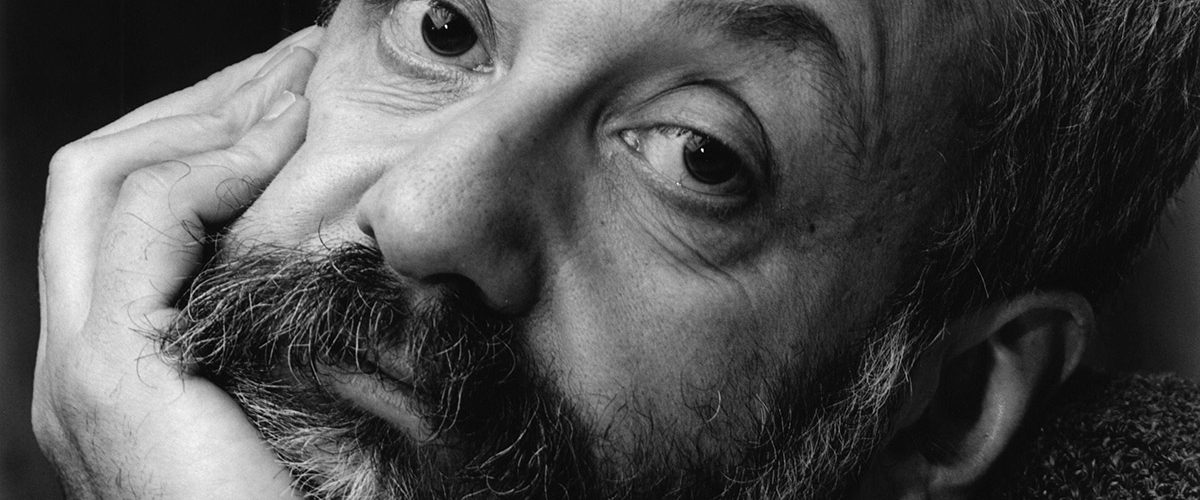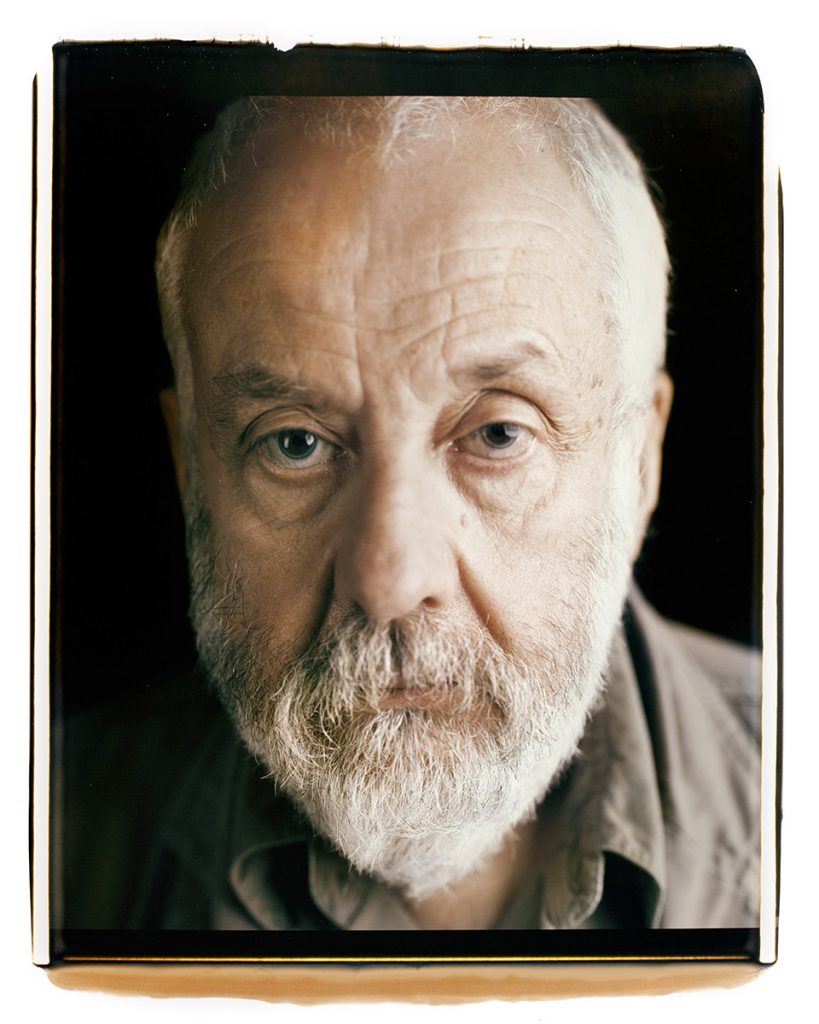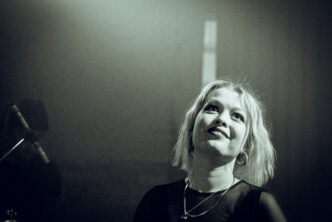Alexandria Slater joins the audience for a live Q&A with acclaimed Salford director, Mike Leigh
Salford-born auteur, Mike Leigh, is one of UK’s most internationally recognised and critically acclaimed film-makers working today. A seven-time Oscar nominee, winner of five BAFTAs, and nominated for another ten BAFTA awards, Leigh is also the only British director to have won the top prize at both Cannes (for Secrets & Lies, 1996) and Venice (for Vera Drake, 2004).
As part of a nation-wide celebration of Leigh’s work, Home, Manchester is hosting a special season of his early films coinciding with the nation-wide re-release of Naked, which won Leigh best director and David Thewlis best actor, at Cannes Film Festival in 1993, as well as a nomination for the Palme d’Or.
The film, newly remastered in 4K by the BFI National Archive, is a powerful and raw depiction of Thatcherism in England. Thwellis’ character, Johnny, is an intellectual, angsty and abusive Mancunian. After a failing attempt to win back his ex-girlfriend, Louise (Lesley Sharp), Johnny toys with Louise’s housemate Sophie (Katrin Cartlidge), exploiting her vulnerability, abusing and then abandoning her. The film follows Johnny wandering the streets at night, unloading his rage onto unsuspecting strangers. It’s a complex and unnerving character study of a destructive misogynist – a by-product of a broken society under Thatcher’s Britain.
Twenty-eight years later, old and new audiences can revel in the controversial and cutting exploration of alienation and male aggression that sadly is still recognisable today.
After the screening, Mike Leigh was live on stage to answer questions from the audience.
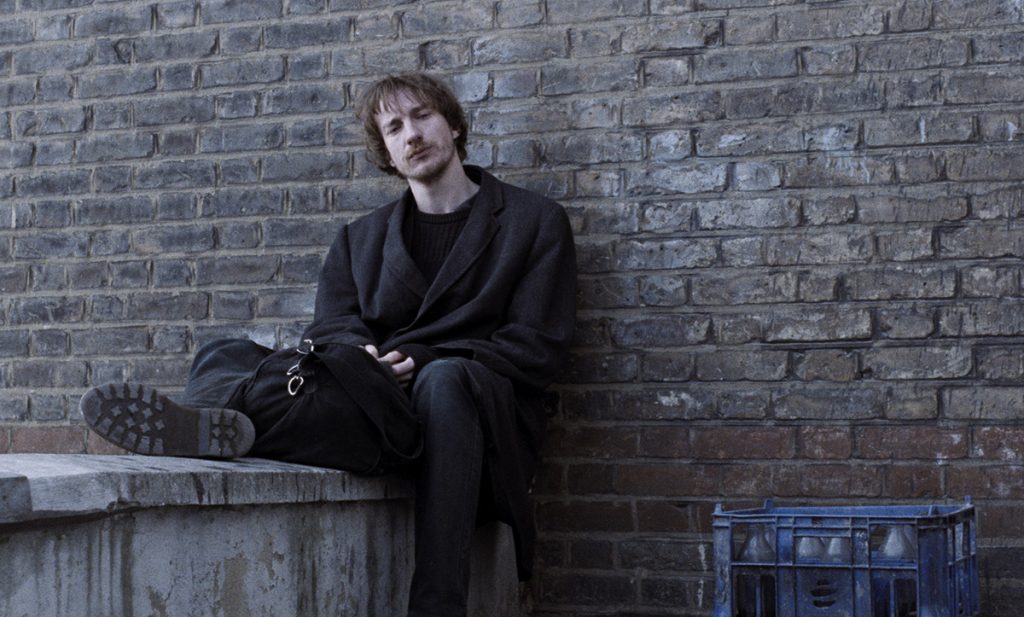
The restoration (of Naked) brings out the colour palette and the visual style of the film. I think people often talk about the content of your work rather than the visual style. Can you talk about how the black and blue colour palette was developed?
Mike Leigh: “The film was shot by Dick Pope, cinematographer, who’s shot all of my films since 1990. But it was also designed by Alison Chitty, who designed Life is Sweet and Secrets and Lies.
“I spend quite a long time, over months, with the actors developing the characters and relationships. But there has to come a point in that process where I share with the guys behind the camera. With the cinematographer, and the designer and the costume designer and the makeup designer, what I think is evolving.
“In the case of this particular film, Naked, I said, ‘Look, this is a solo journey. This is nocturnal’. We knew we were going to shoot the film in colour but somehow it’s monochromatic, it’s dark. So Dick Pope used something called bleach bypass, where you miss one of the things that happen in the laboratory, and you get this effect. So we sat and looked at those reels and then, as always happens, he shot some tests in collaboration with the designers. And it was absolutely stunning – very, very dark and very, very moody.
“Obviously for me, I’m thinking 24-7 about the characters and relationships in my head, but once I’m sitting with them and looking on screen at the tests, that feeds back. I’m now thinking about filmmaking, the practicalities and the actual cinematics, as well as the dramatics. So really, that’s how it came about. We haven’t changed the story. It’s merely enhancing it and also taking out all the gunk and scratches that accrue over time”.
How did you go about finding settings and locations?
Mike Leigh: “That building that the flat is in – Alison Chitty is a brilliant designer and she kept coming back with various houses and buildings in London and I’d say, ‘This is just a building with a flat in it. It has to have an edge’. I couldn’t quite put my finger on what that edge was, and then one day they rushed in and said, ‘How about this?’ And they found this building we’ve been looking at and it’s on the corner and it’s like Charles Adams. It’s neo-gothic and it’s on an angle. I said it’s great, so that was that.
“One of the great contributions that Alison Chitty made was we invented this guy, Brian (security guard) in this working office block. And one day she came in and she said, ‘I’ve had a brain wave, I’ve found this building and it’s empty. There’s nothing in it at all, it’s an office block that’s not been used. So how about if he’s guarding empty space?’ I said, ‘That’s fantastic, that’s absolutely what the film’s about’.
“And one tiny detail in design – ,one of the things about the discipline about the visual look was to avoid reds. So in the office block, if you look very carefully, there is a grey fire bell on the wall. Now there aren’t any grey fire bells anywhere; they’re all red. But Alison Chitty painted it grey because she didn’t want any red in the shots, little bit arty but I like it”.
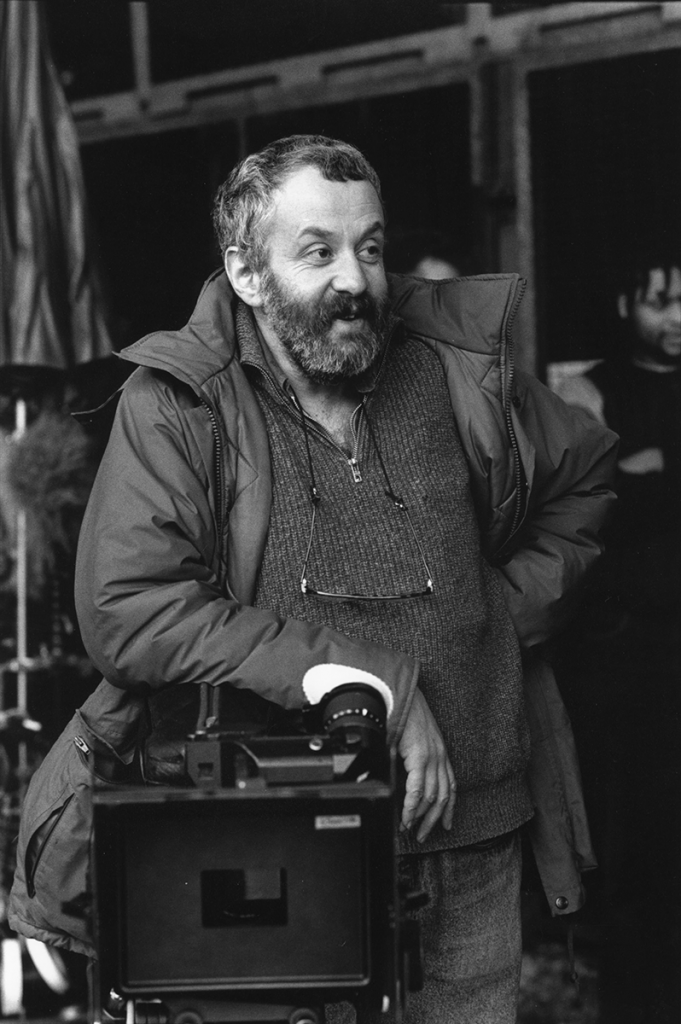
Where do your narrative ideas come from?
Mike Leigh: “Life. It comes from life. There are so many facets. I mean people say, ‘Oh, your films are about working-class life’. Well they are sometimes, and there are also working-class characters. But it’s about people, really, and I think it’s the little ways of looking at different kinds of people even though it’s the same sort of philosophy”.
If you were to bring Johnny back to life now, would he be a success, would he have destroyed himself or is he destroying others?
Mike Leigh: “I mean, it’s a hard one this. You see, here’s the thing about Johnny, and nothing about this guy or the film is black and white. But I think first of all, the thing about Johnny, apart from anything else, I think he’s the victim of a crap education system. If at school, instead of sending him out of the room or putting him in detention every time he opened his mouth, they thought, this is a bright kid to nurture and bring out, he’d have been different to the guy we’ve just seen in the film. I’m not sure that what we have in Johnny, is a victim of ‘conspiracy theory-itis’, as it were. I think he’s a very intelligent guy, a very frustrated guy. His head is full of ideas, but he is an idealist, an intelligent idealist who is frustrated by how the world is. So I’m not sure that he’s the guy that you project, but don’t ask me to say precisely where he would be now because I just don’t know”.
You use character acting in all your films, where the actors become the character and improvise the scenes as if they were a real person. However, suppose things happen in an improvised situation that isn’t what you envisioned the character to say or do, or you want something different to happen. How do you navigate this without making it forced and stripping the authenticity?
Mike Leigh: “First of all, I’m in on it with the actors from the word go. We have collaborated with the actors to create the characters, so my job inevitably, is to understand the character completely. So if the actor says, ‘I don’t think they would do that’. My job is not to say, ‘Bog off and do it’ or ‘I just don’t agree with you and that’s that’. I will immediately understand why that is. So we have in our armoury, at our disposal, an understanding of the character as a real person and his or her motivation. And you know, you can work with the motivation. It’s in some way negotiable, and the actor always wants to cooperate without compromising, and I want to do the same thing without compromising. So it’s about improvisation, intelligence and collaboration”.
And finally, how has your Mancunian background impacted your filmmaking?
Mike Leigh: “Well, I have to say, apart from everything else, that if it were not for my Mancunian background, you would not have had an unpredictable moment in this film. The Manchester anthem: ‘Take me back to Manchester when it’s raining’, that’s a very important aspect of the film. We had a blast inventing the fact that Johnny and Louise came from Manchester. It informs the film in an implicitly Mancunian way. And, I think there’s a certain Mancunian, Salfordian wry, wry look at the world going on in these films”.
Mike Leigh Retrospective is at HOME, Manchester from 7 – 30 November 2021
For full details of the BFI’s Mike Leigh Celebration visit bfi.org.uk

